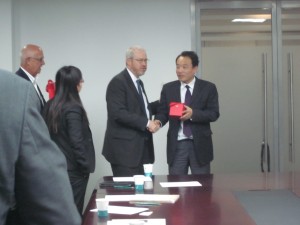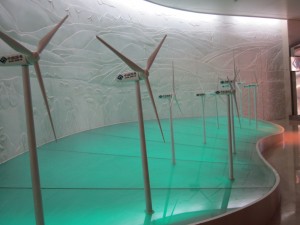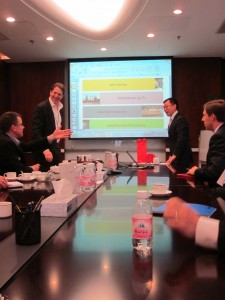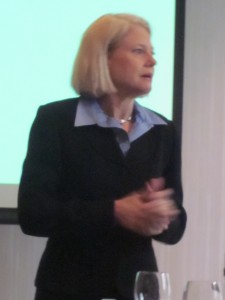It was apparent before 6 a.m. that there are environmental problems in China. I headed out for a short run, but before I could get around the block I could feel and smell the dirty air. I felt a little sick for an hour during the late morning. I think I will try the indoor gym tomorrow.
Today was a full day of meetings. We started out with a briefing by the China Greentech Initiative. Elle Carberry told us that China’s experience bringing people out of poverty has been remarkable, but that it has come at an environmental cost.
She and her team emphasized the importance of water in China: It may be the largest issue in China. They seen it as a bottleneck inhibited future economic growth. In fact, there is an effort to divert water resources in the south of China to Beijing–in an amount the size of Lake Erie. Further, there will be efforts to significantly increase the development of natural gas–which requires enormous amounts of water.

We moved on to a briefing at the State Grid Corporation of China. SGCC is a huge nearly nationwide utility. It has 1.56 million employees, covers 88 percent of China, and has over one billion customers. The work that they are doing to find innovations to deliver power more efficiently and cleaner was impressive. The knowledge gained through many of their pilot projects may glean insights that can lead to improvements the world over.
A female executive, Li Wei, Regional Manager, International Department, of the Guodian United Power Technology Company Ltd. led the next discussion. Ms. Li is responsible for sales throughout North America, Australia, and Africa for United Power. The company has installed 1,337 wind turbines in China and in Texas. The largest of these wind turbine generators is capable of producing 3 megawatts.
 Our final meeting of the day was with Shelby Chen, Managing Partner of Tsing Capital, a cleantech venture fund located in Beijing. Tsing Capital is close to closing a $350 fund and is on of the oldest and most experienced VC firms in China. Mr. Chen noted that, per unit of GDP, China requires 5 times the energy that Japan requires and 3 times that of the US. He believes that there are great business opportunities in China, but the firm’s investment strategy isn’t based on the ‘killer app’ model. Rather Tsing Capital looks for commercial success potential first. His advice to American firms looking to get into the China market is to make yourself into a Chinese company (in China).
Our final meeting of the day was with Shelby Chen, Managing Partner of Tsing Capital, a cleantech venture fund located in Beijing. Tsing Capital is close to closing a $350 fund and is on of the oldest and most experienced VC firms in China. Mr. Chen noted that, per unit of GDP, China requires 5 times the energy that Japan requires and 3 times that of the US. He believes that there are great business opportunities in China, but the firm’s investment strategy isn’t based on the ‘killer app’ model. Rather Tsing Capital looks for commercial success potential first. His advice to American firms looking to get into the China market is to make yourself into a Chinese company (in China).
We closed the day navigating through enormous traffic jams.

